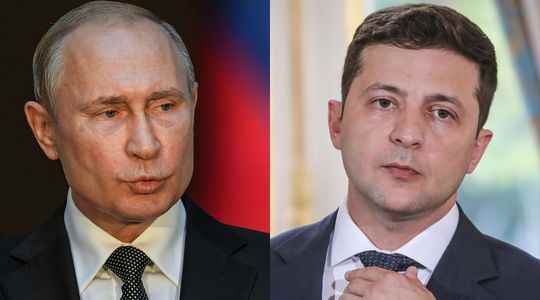The war started with an image. That of the face of Vladimir Putin announcing the Russian invasion on the lands of his Ukrainian neighbor. It is 5:30 a.m. on Thursday February 24 and the Head of State, in a message previously recorded in the massive and austere decorum of the Kremlin, puts an end to several weeks of diplomatic talks aimed at calming the situation on the Russian border: “I have decided to launch a special military operation.”
The setting strangely resembles the one in which Vladimir Putin had recorded, a few days earlier, his speech recognizing the independence of the regions of Luhansk and Donetsk, in eastern Ukraine. The leader unfolds the obsessions he has been dwelling on for months: the denazification of Ukraine, the threats of NATO, the greatness of Russia… “It’s a corseted, hieratic communication like the Kremlin has. habit”, notes for L’Express Cécile Alduy, semiologist and author The Language of Zemmourpublished by Seuil.
A show of strength
The Russian leader cheekily picked his moment. At the same time, the UN Security Council met urgently in New York. The chronology chosen by Vladimir Putin to announce the mobilization of his troops in Ukraine is a show of force. “The Russian head of state has built, for several decades, a media and political image of harshness. He tries to multiply the blows of force. His offensive speech in Ukraine aimed to show his muscles to the West “, deciphers for L’Express the doctor of information and communication sciences, Valentyna Dymytrova. For a decade, the head of the Kremlin has muzzled the slightest criticism of him and dramatized his authority. Its entry into the war responded to this logic.
In the face of Russia’s lightning attack, Ukrainian President Volodymyr Zelensky had to respond both in the military field and in the media. The media operation can be particularly beneficial militarily. It is immediately essential for him to mobilize the Ukrainian population behind the resistance and to call on the international community to support him. “His strategy is twofold: it is as much a call for international solidarity as for resistance”, underlines Valentyna Dymytrova.
A few minutes after the first Russian bombardments, on February 24, the first words of the president are directly addressed on Facebook to its population: “Don’t panic, we are ready for anything, we will win”. “Thanks to a reactive, abundant and very close communication with the citizens, he managed to acquire the posture necessary to represent Ukraine. Even the citizens who were his most fervent opponents see in him a legitimacy as a leader. This is where Volodymyr Zelensky is in the process of emerging victorious from this battle of images” she adds. In a country that was presented as divided between pro-Russians and pro-democracy and plagued by great political instability for a decade, the leader has managed to unify his troops behind his face.
The omnipresence of social networks
Facebook, Instagram, Twitter, Telegram… He varies the channels to multiply addresses to his people on social networks. “We feel that he is a man who has a great experience of the media, slice Cécile Alduy. He managed to mobilize outside the country by playing on empathy, by betting on humanity. He believes in a humanist surge.” His communication was followed by effects since the Western world multiplied humanitarian, economic and military aid. The Polish neighbor has taken in almost 200,000 refugees. France and Germany, in particular, announced this weekend, a supply of weapons.
The other issue of the presence on social networks for the two powers is that of misinformation. Many images of clashes in Kiev or the surrounding area are diverted, redacted or even modified. Russia’s networks of influence aim to impose the elements of the narrative that Moscow seeks to convey around this conflict. “The target of Vladimir Putin’s communication is now above all internal. He does not intend to appease international opinion but to speak to his people. A period of war can create a burst of mobilization among citizens , its whole strategy aims to maintain internal order, to manage public opinion”, remarks Cécile Alduy. The very vertical and solemn speeches of the Head of State respond to this desire to highlight the Ukrainian threat and justify the intervention with its population. Not to convince the West.
The Kremlin went further in controlling what the population might think since it simply had the terms “war” or “invasion” removed from the news and the media. Censorship which proves the fragility of the Russian plan, according to Valentyna Dymytrova: “It’s a very risky strategy because it can lead to a start: we have seen many open letters from doctors, Russian writers calling for peace, these last days.”
Overall story
This war is also a clash of worldviews. Vladimir Putin’s speeches, upright and austere, respond to the alternative representation that he wants to embody contrary to the West: “Russia embodies a global narrative: anti-liberal, affirming nationalist values, and in opposition to the United States which can find an echo in part of the Western political class”, reacts Valentyna Dymytrova.
Moscow’s communication is not improvised, it is calculated and testifies to a campaign of influence carried out for many years towards the East in particular. “Since the start of the crisis, Putin has inevitably isolated himself and he therefore particularly highlights his allies,” she says. Vladimir Putin took care to highlight the phone call of support from Syrian leader Bashar al-Assad and staged his meeting with the Prime Minister of Pakistan, Imran Khan.
For his part, Zelensky has the Western camp behind him. By relying in this way on civilian populations by sometimes directly challenging them on social networks, it is rather massively supported in these countries. “He is a kind of new face of the West”, thinks Valentyna Dymytrova. The military advance of the Russian army in the coming days will inform us about the weight of communication in the face of weapons.
